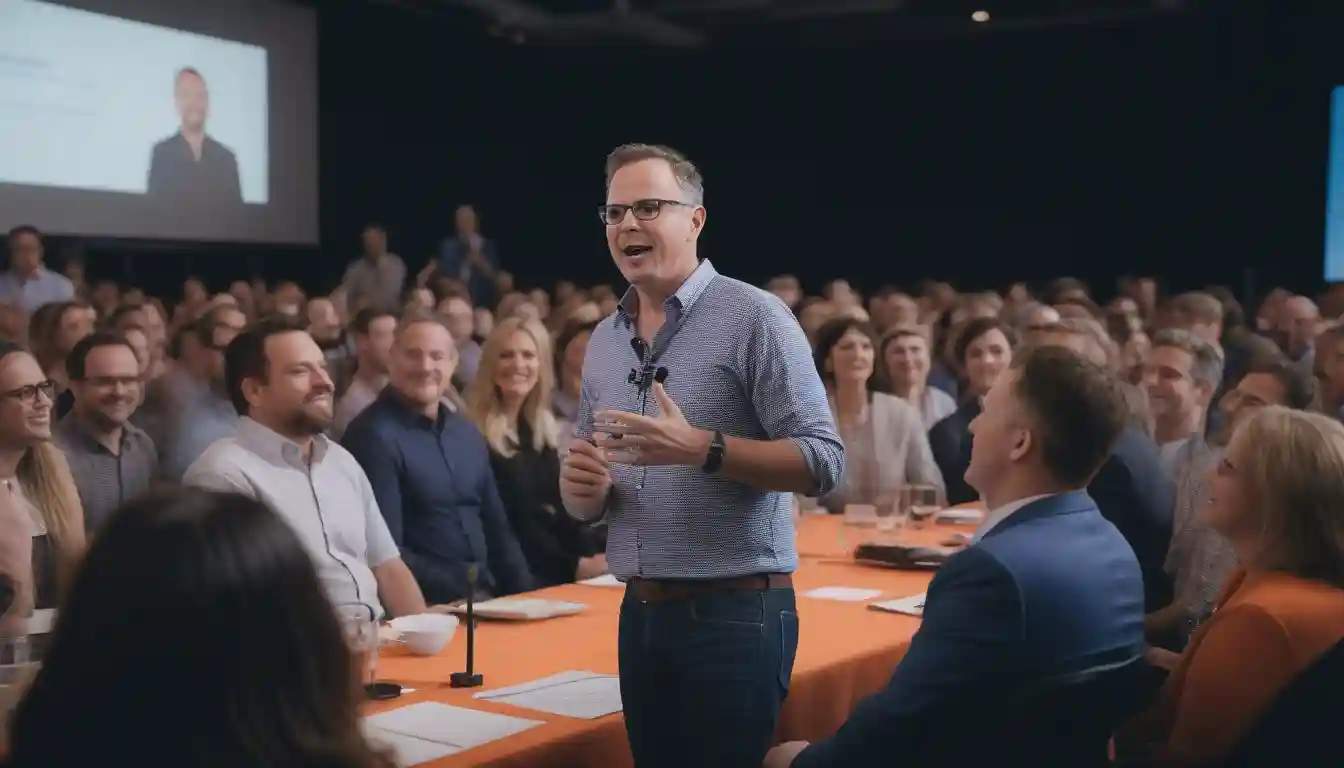
Imagine the U.S., where fresh and healthy groceries, medical supplies, or even your favorite takeout are delivered right to your doorstep by a small, electric, self-driving robot at a super low cost. This means you don’t have to take your SUV or pickup truck and drive the next 1 or even 10 miles just for shopping. Moreover, this way, you will have much more free time to spend as you want rather than doing grocery shopping (which, let’s be honest, not everyone enjoys😉).
Sounds interesting, right? This sounds especially promising for Americans who live in food deserts, considering that approximately 20 million Americans live in food deserts. That’s the problem Nuro is tackling — an innovative company that aims to transform e-commerce with its autonomous, cargo-only vehicles.
But behind this incredible technology is an equally remarkable individual — Jiajun Zhu, Chief Executive Officer and co-founder of Nuro. A former Google engineer and one of the key developers of Waymo, Zhu has taken his deep expertise in autonomous technology and applied it to solve everyday problems in ways no one imagined before. Let’s take a closer look at the man who drives the revolution in robotics and his robotics company — Nuro.
Jiajun Zhu’s education & career beginnings
Jiajun Zhu’s journey into the world of robotics and autonomous technology began with a strong academic foundation. He earned his Bachelor’s degree in Computer Science from Fudan University, one of China’s most prestigious universities. Driven by his passion for technology and innovation, Zhu pursued his Master’s degree in Computer Science at the University of Virginia, where he further honed his skills in software engineering and AI.
After completing his education, he started as a Software Engineer Intern at Intel from January 2005 to April 2005, where he worked for 4 months. However, Zhu’s career took a major leap forward when he joined Google. He quickly became a key player in Google’s self-driving car project, which would later be known as Waymo, one of the most advanced autonomous vehicle initiatives in the world. As one of the founding team members, Zhu contributed significantly to the project’s success. His role primarily involved leading the perception team, which focused on enabling vehicles to understand and navigate complex environments using sensors, cameras, and advanced AI algorithms.
Zhu’s experience at Google was transformative. He not only worked on developing the hardware and software for self-driving cars but also helped build and lead the simulation efforts — a crucial aspect of autonomous driving, allowing millions of virtual miles to be driven in simulated environments to fine-tune the technology. The lessons Zhu learned at Google — balancing cutting-edge technology with real-world practicality — shaped his approach to autonomous vehicles. While Waymo aimed to revolutionize passenger transport, Zhu saw an opportunity to impact local commerce by designing a new category of self-driving vehicles that were safer, smaller, and more specialized for delivery.
At Google, he worked closely with Dave Ferguson, and they both shared a vision that in the next 10-15 years, robotics and intelligent robots would have a profound impact on society. This shared belief was the driving force behind starting their own company.
Nuro: Changing the world with autonomous deliveries
Thus, in 2016, Jiajun Zhu and Dave Ferguson founded Nuro. Jiajun Zhu’s previous deep dive into the complexities of autonomous systems laid the foundation for his work with Nuro, where he started to apply his insights from Waymo to create a new kind of autonomous vehicle designed for local goods delivery rather than passenger transport. Thus, Nuro’s focus is aimed solely at deliveries.
Nuro’s mission
At its core, Nuro’s mission is to improve everyday life through advanced robotics. And this is how:
“People spend a lot of time at the grocery stores. This led us to the first idea of creating a vehicle that completely drives by itself, can deliver lunch food, groceries, packages, pharmaceutical products to people rather than having people go,” says Jiajun Zhu.
Co-founders Jiajun Zhu and Dave Ferguson envisioned a future where intelligent robots would have a profound impact on society. They believe that within the next 10 to 15 years, robotics would evolve to play a significant role in enhancing human lives.
Driven by this vision, Nuro’s goal is to create technology that betters people’s lives and gives people back valuable time while increasing access to goods and services. By leveraging robotics, they aim to build solutions that simplify daily tasks and contribute to a more efficient and convenient lifestyle.
Nuro’s safety and efficiency aspects
What do these vehicles look like, and are they safe? Good questions. Nuro’s vehicles are electric, fully autonomous and designed without any driver seats, steering wheels, or even side mirrors, making them compact and ideal for urban environments. This unique focus allows Nuro’s robots to optimize for safety and efficiency in transporting goods such as groceries, prescriptions, or meals from local businesses to consumers’ doorsteps. There’s also one important aspect that Jiajun Zhu explains,
“Autonomous vehicles will definitely make the roads more safer. If you look at just the U.S, 40 000 people die in car accidents every year, and I believe we will be able to eliminate all of these accidents once we have autonomous vehicles everywhere.”
Another of Nuro’s groundbreaking milestones is its partnership with the U.S. Department of Transportation, as it became the first autonomous vehicle company to receive an exemption from traditional vehicle safety requirements. This means Nuro’s vehicles don’t need features like windshields or airbags, which are typically required for human-driven cars, paving the way for more streamlined designs focused exclusively on delivery. This exemption allowed Nuro to deploy vehicles like the R2, its second-generation delivery robot, which can operate on public roads without a driver. They were also the first to receive a permit for fully driverless operations in California, marking them as pioneers in the autonomous delivery space.
Moreover, Nuro’s technological prowess is demonstrated by the fact that its autonomous delivery robots have logged over 1 million miles on public roads with zero at-fault incidents. This safety record is a testament to the advanced AI, sensors, and simulation tools that power the vehicles. Nuro’s autonomous systems are designed to navigate the complexities of urban environments, identifying obstacles, pedestrians, and traffic to ensure seamless and secure deliveries.
Nuro’s sustainability and environmental impact
Nuro’s sustainability efforts are also impressive. Its fully electric, autonomous vehicles are designed to significantly reduce the environmental footprint of everyday deliveries. By replacing traditional gasoline-powered cars that many use to transport small items, Nuro’s electric fleet helps cut down CO2 emissions and reduces air pollution.
“A lot of people drive SUVs or pickup trucks just to pick up one package of milk, right? These are very heavy gasoline vehicles; meanwhile, all of Nuro’s vehicles are electric ones. We will be able to reduce CO2 carbon emissions by a huge amount,” explains Zhu.
By providing eco-friendly delivery solutions, Nuro is making cities greener while simplifying daily tasks for consumers. Nuro’s electric fleet not only reduces carbon emissions but also helps alleviate traffic congestion.
Nuro’s economic contribution
Nuro’s low-cost delivery service has the potential to address one of the most critical issues in the U.S.: food deserts. Nearly 20 million people struggle to access fresh, healthy food due to unreliable transportation. By providing affordable, autonomous delivery options, Jiajun Zhu can bridge this gap, ensuring that underserved communities gain easier access to essential goods.
Some people might start thinking that many jobs will be eliminated, but in fact, as autonomous delivery expands, it will create new jobs in areas like manufacturing, engineering, and high-tech sectors. The demand for retail roles, such as package handling, will also rise as delivery costs decrease, fostering economic growth.
Nuro nowadays
Through strategic partnerships with major brands like Uber, Kroger, and CVS, Nuro has expanded its delivery services to include groceries, meals, and medical supplies. This positions Nuro as a leader in the on-demand delivery market, offering businesses a highly efficient, autonomous solution to meet customer needs. Nuro’s vehicles are currently operational in states like California and Texas, where the company continues to expand its reach.
However, in September 2024, Nuro announced that it was changing its business plan. Instead of making and using its own delivery robots (which proved to be expensive), Nuro will now sell its self-driving technology to car companies and delivery services. This means Nuro will focus on creating the technology that makes cars drive themselves but won’t build its own vehicles anymore. This shift helps Nuro save money and stay in business longer while still working on improving autonomous driving.
At the core of Jiajun Zhu’s vision is a future where people’s lives are made easier through innovative, driverless technology. Whether it’s delivering groceries or helping reduce traffic, Jiajun Zhu is redefining the role of autonomous vehicles in daily life, making transportation more accessible, safe, and sustainable.
Zhu believes autonomous vehicles will not only make roads safer but also change how we live. By offering low-cost delivery services and addressing food deserts, Nuro is poised to improve access to essential goods and create jobs in sectors like manufacturing and retail.
“Autonomous vehicles will change the way people spend time and where they choose to live. You won’t need to really think about distance the way we think about it today. I think it’s an exciting future!” he says.
Bottom line
Jiajun Zhu stands out not only for his technical expertise but also for his visionary leadership and relentless pursuit of innovation. What’s impressive about him is his ability to identify practical, real-world problems — like the inefficiency of everyday errands — and apply cutting-edge technology to solve them.
His decision to focus on goods delivery rather than passenger transport reflects his keen sense of impactful innovation. Zhu’s humility and forward-thinking approach, combined with a deep commitment to making technology serve humanity, make him an inspiring figure in the tech world.






